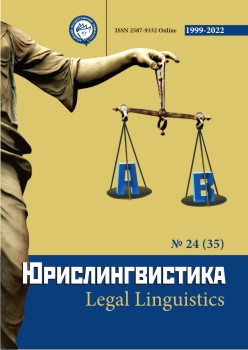Негативные аспекты использования концепта «империя» для определения геополитической сущности Российского государства
Аннотация
В статье ставится цель раскрыть негативные аспекты использования термина «империя» для характеристики Российского государства и определения его геополитической сущности. Методологической основой исследования являются достижения лингвистического поворота в социо-гуманитарных исследованиях, которые еще не в должной мере учтены в юридической науке. Лексемы, как единицы конкретного языка, не просто обозначают те или иные явления окружающего мира, а функционируют как своеобразные вещи, определяющие кругозор носителя языка, ту или иную картину мира, вплоть до ценностных предпочтений и установок. Признается, что в социальной коммуникации функционируют не абстрактные дефиниции, а именно концепты, которые определяют реальное содержание дискурса. Обращается внимание на то, что в современном научном и публичном дискурсе наблюдается процесс возрождения термина «империя» в позитивном значении этого слова. Но иностранный термин «empire» и соответствующий концепт «империя» не релевантны России, т. к. в них не отражается действительная история возникновения и становления российского государства. В хронологических рамках Нового времени и Новейшей истории предлагается ввести принципиальное различие колониальных империй и территориальных держав. С одной стороны, о Британской и Российской империях объективным будет суждение о том, что эти государства имели обширную территорию с разнообразным в этническом и религиозно-культурном аспекте населением. Но, с другой стороны, по форме и сущности это были различные территориально-политические образования. В ходе намеренного затушевывания этого различия и был создан политический миф о России как «тюрьме народов», принятый, к сожалению, основной частью отечественной интеллигенции. В заключение в контексте вопроса о соотношении концептов «империя» и «держава» сделан вывод о необходимости преодоления компилятивно-подражательного стиля развития России, что должно проявиться в более внимательном отношении к построению системы научных и законодательных терминов, определяющих сущность российского общества и государства.
Скачивания
Metrics
Литература
Бердяев Н.А. Философская истина и интеллигентская правда / Вехи; Интеллигенция в России. Сб.ст. М., 1991.
Гадамер Г. Истина и метод. Основы философской герменевтики. М., 1988.
Гиренок Ф. Пато-логия русского ума (Картография дословности). М., 1998.
Делез Ж., Гватари Ф. Что такое философия? М., 2009.
Генри Киссинджер: Чтобы понять Путина, надо читать Достоевского, а не Mein Kampf. URL: http://www.russiapost.su/archives/96042.
Ключевский В.О. Русская история. Полный курс лекций в 3-х книгах. Кн. 2. М., 1993.
Левен Д. Российская империя и ее враги. М., 2007.
Лингвистический энциклопедический словарь. М., 1990.
Маккиндер Х. Географическая ось истории / Политология: хрестоматия. М., 2000.
Мартин Т. Империя «положительной деятельности». Нации и национализм в СССР. 1923-1939. М., 2011.
Синюков В.Н. Российская правовая система. Введение в общую теорию. М., 2010.
Степанов Ю.С. Константы: Словарь русской культуры. М., 2001.
Федотов Г.П. Судьба империй / Г.П. Федотов Новый Град. Нью-Йорк, 1952.
Филин Ф.П. Очерки теории языкознания. М., 1982.
Copyright (c) 2022 Рафаил Насыров

Это произведение доступно по лицензии Creative Commons «Attribution» («Атрибуция») 4.0 Всемирная.
Авторы, которые публикуются в данном журнале, соглашаются со следующими условиями:
1. Авторы сохраняют за собой авторские права на работу и передают журналу право первой публикации вместе с работой, одновременно лицензируя ее на условиях Creative Commons Attribution License, которая позволяет другим распространять данную работу с обязательным указанием авторства данной работы и ссылкой на оригинальную публикацию в этом журнале.
2. Авторы сохраняют право заключать отдельные, дополнительные контрактные соглашения на неэксклюзивное распространение версии работы, опубликованной этим журналом (например, разместить ее в университетском хранилище или опубликовать ее в книге), со ссылкой на оригинальную публикацию в этом журнале.
3. Авторам разрешается размещать их работу в сети Интернет (например, в университетском хранилище или на их персональном веб-сайте) до и во время процесса рассмотрения ее данным журналом, так как это может привести к продуктивному обсуждению, а также к большему количеству ссылок на данную опубликованную работу (Смотри The Effect of Open Access).











